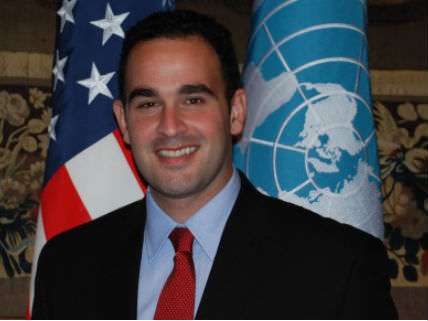Former Obama Staffer Says Legalizing Marijuana Would Decrease Civil Liberties

The Baker Institute at Rice University has been hosting an online debate this month to answer the question, "Will legalizing marijuana improve civil liberties?" While all four participants have a different opinion on what the legal status of marijuana should be, three of the four are in agreement that the way drug laws are enforced--particularly, the absurd degree of flexibility granted to law enforcement officers--poses a threat to civil liberties, and that liberalizing pot laws--to one degree or another--would restore civil liberties.
Only the fourth and final participant in the Baker Institute's debate bothered to argue that removing or reducing penalties for marijuana possession would reduce civil liberties. That person is Kevin Sabet, a former staffer in Pres. Obama's White House Office of National Drug Control Policy, the co-founder of Project SAM, and the "quarterback of the anti-drug movement." Here's his pitch:
The argument that legalization would improve civil liberties rests on the notion that if marijuana was legal, there would be less of a need for the criminal justice system intruding on the lives of otherwise peaceful marijuana smokers. But it is unclear that legalization would greatly reduce criminal justice (specifically law enforcement) involvement in society. Already, only about two-tenths of 1 percent of all prison inmates appear to be incarcerated in prison simply for marijuana use.
Since legalization would increase use, it is important to briefly dwell on the possibility that legalization might decrease civil liberties, especially for vulnerable populations like children. Marijuana smoking during pregnancy has been shown to decrease birth weight, most likely due to the effects of carbon monoxide on the developing fetus. Marijuana addicts 1 out of every 6 children who ever try the drug. Marijuana affects the developing brain in acute ways; one recent study found that persistent, heavy young users had on average 6-8 lower IQ points by age 38 relative to non-users (even if heavy use stopped in adulthood).
Marijuana's harm extends beyond that done to the individual. Marijuana intoxication at least doubles the risk of getting into a car accident; costs from marijuana-related hospital stays are substantial; marijuana addiction costs the state money for treatment; etc.
John Stuart Mill famously wrote that "… over himself, over his own body and mind, the individual is sovereign." Mill argued that "The only purpose for which power can be rightfully exercised over any member of the community, against his will, is to prevent harm to others." Since marijuana can cause addiction, forcing people to lose control over their own self and in the process inflict harms onto others, its use can decrease overall civil liberties. And since legalization would undoubtedly increase marijuana use in society, we might expect a reduction, not increase, in civil liberties if marijuana was legalized.
Right up front, it's important to note that Sabet is being deceptive when he suggests that prison is the only way the government intrudes on the "lives of peaceful marijuana smokers." Monitoring and mandatory testing (which Sabet supports) is an intrusion; terminating the parental rights of marijuana-growing and -using parents is an intrusion; asset forefeiture is an intrusion; mugshots are an intrusion; handcuffs are an intrusion. Three-quarters of a million annual pot arrests--even if only a fraction of them led to incarceration--equals three-quarters of a million government intrusions.
But there's a huge definitional problem here, too. Negative rights--which is what civil liberties are, and what the Bill of Rights is a collection of--exist to protect U.S. citizens from their government and its agents. This is why the First Amendment begins with "Congress shall make no law…" and not "Mike shall make no choice…" In the event that addiction reduces my ability to make healthy choices, my constitutional rights to speech, religious observance, and assembly, and to be spared unreasonable search and seizure, remain intact. In the event that irresponsible drug use causes someone to hurt me, or me to hurt someone else, those rights are what keep us from being cruelly punished or locked away without a trial, while the criminal code nominally assures that justice is done.
Simply put: Drug users cannot erode civil liberties. Nor, for that matter, can Kevin Sabet. Only government has that power.
H/t Diane Wattles Goldstein


Show Comments (59)